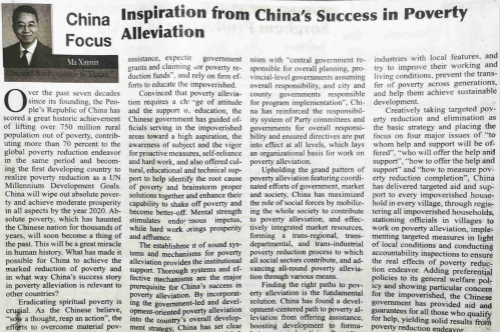
2019年11月13日,驻苏丹大使马新民在《苏丹视野报》“中国聚焦”专栏发表题为《中国脱贫的启示》的署名文章。全文如下:文章源自英文巴士-https://www.en84.com/8260.html
文章源自英文巴士-https://www.en84.com/8260.html
On November 13, 2019, Chinese Ambassador to Sudan Ma Xinmin publishes a signed article titled “Inspiration from China’s Success in Poverty Alleviation” for the China Focus Column on Sudan Vision. The full text is as follows:文章源自英文巴士-https://www.en84.com/8260.html
文章源自英文巴士-https://www.en84.com/8260.html
中国脱贫的启示文章源自英文巴士-https://www.en84.com/8260.html
Inspiration from China’s Success in Poverty Alleviation文章源自英文巴士-https://www.en84.com/8260.html
文章源自英文巴士-https://www.en84.com/8260.html
新中国成立70年一项伟大的历史性成就是实现农村超过7.5亿贫困人口脱贫,为同期全球减贫贡献率超过七成,成为第一个实现联合国千年发展目标减贫目标的发展中国家,并将在2020年彻底告别极端贫困,实现全面小康。千百年来困扰中华民族绝对贫困问题即将历史性地划上句号,书写了人类发展史上的伟大传奇。中国何以脱贫,对我们有何启示?文章源自英文巴士-https://www.en84.com/8260.html
文章源自英文巴士-https://www.en84.com/8260.html
Over the past seven decades since its founding, the People’s Republic of China has scored a great historic achievement of lifting over 750 million rural population out of poverty, contributing more than 70 percent to the global poverty reduction endeavor in the same period and becoming the first developing country to realize poverty reduction as a UN Millennium Development Goals. China will wipe out absolute poverty and achieve moderate prosperity in all aspects by the year 2020. Absolute poverty, which has haunted the Chinese nation for thousands of years, will soon become a thing of the past. This will be a great miracle in human history. What has made it possible for China to achieve the marked reduction of poverty and in what way China’s success story in poverty alleviation is relevant to other countries?文章源自英文巴士-https://www.en84.com/8260.html
摆脱思想贫困是关键。思想决定行动,解决物质贫困重在根治思想贫困。中国国家主席习近平说:“摆脱贫困,首先在于摆脱意识和思路的‘贫困’”。摆脱思想贫困就要改变思想观念、激发内生动力,提高教育水平。脱贫致富贵在克服“等、靠、要”思想,贵在立志,贵在教育。
Eradicating spiritual poverty is crucial. As the Chinese believe, “sow a thought, reap an action”, the efforts to overcome material poverty should be focused on eradication of spiritual poverty. Chinese President Xi Jinping once pointed out, “for the purpose of poverty alleviation, the first important thing is to get rid of ‘poverty’ in perceptions and thoughts”. Eradication of spiritual poverty requires changing the mindset, stimulating endogenous impetus and enhancing the level of education. The eradication of poverty and achievement of prosperity hinge on abandoning the attitude of “passively longing for national assistance, expecting government grants and claiming for poverty reduction funds”, and rely on firm efforts to educate the impoverished.
中国将扶贫与扶志扶智相结合,一方面引导贫困地区干部群众树立鸿鹄之志,增强主体意识,发扬主动作为、自力更生和艰苦奋斗精神;另一方面,通过送文化、送教育、送技术上门,帮助群众谋思路、找门路、挖穷根,提高脱贫致富能力。精神力量激发内生动力,埋头苦干创造富裕繁荣。
Convinced that poverty alleviation requires a change of attitude and the support of education, the Chinese government has guided officials serving in the impoverished areas toward a high aspiration, the awareness of subject and the vigor for proactive measures, self-reliance and hard work, and also offered cultural, educational and technical support to help identify the root cause of poverty and brainstorm proper solutions together and enhance their capability to shake off poverty and become better-off. Mental strength stimulates endogenous impetus, while hard work brings prosperity and affluence.
建立脱贫制度机制是保障。完备的制度和高效的机制是中国脱贫的重要基础。中国坚持政府主导,将扶贫开发纳入国家总体发展战略,分阶段明确减贫目标和扶贫标准,制定脱贫专项规划,集中力量组织开展大规模专项扶贫行动,针对特定人群组织实施妇女儿童、残疾人、少数民族发展规划,为扶贫提供了宏观政策指导和制度保证。
The establishment of sound systems and mechanisms for poverty alleviation provides the institutional support. Thorough systems and effective mechanisms are the major prerequisite for China’s success in poverty alleviation. By incorporating the government-led and development-oriented poverty alleviation into the country’s overall development strategy, China has set clear goals for poverty reduction and definite standards for poverty relief for different phases, formulated special plans for poverty alleviation, pooled resources to carry out special poverty alleviation programs on a large scale, and executed targeted development plans among certain groups including women and children, the disabled, and ethnic minorities, providing guidance at the macro-policy level and the institutional guarantee for poverty relief.
中国通过建立“中央统筹、省负总责、市县抓落实”的工作机制,强化党政一把手负总责的责任制,层层抓落实,为扶贫工作提供了组织保障。
Through a robust working mechanism with “central government responsible for overall planning, provincial-level governments assuming overall responsibility, and city and county governments responsible for program implementation”, China has reinforced the responsibility system of Party committees and governments for overall responsibility and ensured directives are put into effect at all levels, which lays an organizational basis for work on poverty alleviation.
中国坚持政府、市场、社会协同推进的“大扶贫模式”,充分发挥社会力量作用,动员全社会参与扶贫,有效整合市场资源,形成跨地区、跨部门、跨领域、全民参与的社会扶贫体系,多管齐下,综合治理,推动全面脱贫。
Upholding the grand pattern of poverty alleviation featuring coordinated efforts of government, market and society, China has maximized the role of social forces by mobilizing the whole society to contribute to poverty alleviation, and effectively integrated market resources, forming a trans-regional, trans-departmental, and trans-industrial poverty reduction process to which all social sectors contribute, and advancing all-round poverty alleviation through various means.
找对脱贫路子是根本。从救济式扶贫、开发式扶贫到精准扶贫,中国探索出一条以发展为核心的脱贫之路。救济可以解燃眉之急,却不是治本之方,发展才是消除贫困的根本途径。中国政府坚持开发式扶贫方针,动员、鼓励和引导贫困地区人民利用贫困地区优势资源发展特色产业,增强自我发展能力,改善生产生活条件,阻断贫困代际传递,实现可持续发展。
Finding the right paths to poverty alleviation is the fundamental solution. China has found a development-centered path to poverty alleviation from offering assistance, boosting development to formulating targeted policies. Providing assistance may satisfy the urgent needs but is never the ultimate solution. Instead, development is the fundamental approach to poverty eradication. Adhering to the guideline of development-focused poverty relief, the Chinese government mobilizes, inspires and instructs people in the impoverished areas to improve their capability for self-development through the utilization of premium resources available in the impoverished areas to develop industries with local features, and try to improve their working and living conditions, prevent the transfer of poverty across generations, and help them achieve sustainable development.
中国创造性地实施精准扶贫、精准脱贫基本方略,聚焦 “扶持谁”、“谁来扶”、“怎么扶”、“如何退”四大问题,通过建档立卡摸情况、驻村帮扶守一线、因地制宜准施策、严格督查保质量等举措,将帮扶精确到村到户。
Creatively taking targeted poverty reduction and elimination as the basic strategy and placing the focus on four major issues of “to whom help and support will be offered”, “who will offer the help and support”, “how to offer the help and support” and “how to measure poverty reduction completion”, China has delivered targeted aid and support to every impoverished household in every village, through registering all impoverished households, stationing officials in villages to work on poverty alleviation, implementing targeted measures in light of local conditions and conducting accountability inspections to ensure the real effects of poverty reduction endeavor.
中国实行普惠政策和特惠政策相结合,对贫困人口格外关爱,做到“应扶尽扶、应保尽保”,提高了脱贫实效。
China carries out preferential policies to its general welfare policy and showing particular concern for the impoverished, the Chinese government has provided aid and guarantees for all those who qualify for help, yielding solid results from poverty reduction endeavor.
中国实践证明,脱贫重在以摆脱思想贫困为先导、以施行符合国情的脱贫制度机制为保障、以发展经济为途径。这是中国特色脱贫之路带给我们的启示,也是中国为世界减贫事业提供的有益经验。
China’s practice has proved that the key to poverty alleviation is to eradicate spiritual poverty in the first place, and to practice the poverty alleviation systems and mechanisms suited to national conditions and to adhere to the development-centered path. This is a great inspiration from the poverty reduction practice with Chinese characteristics and also useful Chinese experience for global poverty reduction endeavor.

